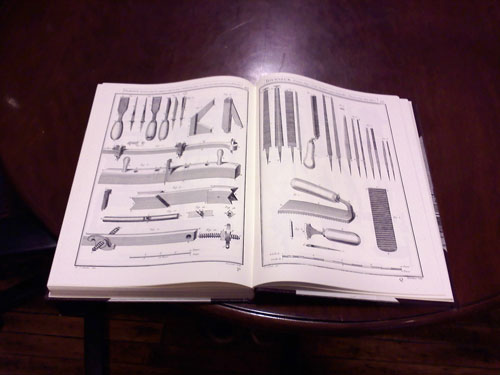|
|
11/18/2010 |
 Recently Chris Schwarz has been typing in a copy of Randell Holmes Academy of Armory, which was published in 1688 and has some very interesting stuff on woodworking in it. You can read . Chris is working from a reprint that was borrowed from a college library by one of his colleagues. Recently Chris Schwarz has been typing in a copy of Randell Holmes Academy of Armory, which was published in 1688 and has some very interesting stuff on woodworking in it. You can read . Chris is working from a reprint that was borrowed from a college library by one of his colleagues.
For those of us without a friendly college collection there are some very simple ways to get a crack at the book.
Early English Books Online is an on-line resource that contains every early English book. The collection has in addition to Randell Holme, tons of correspondence from the period, many many editions of Moxon, and gobs of other stuff. Sadly the interface doesn't allow downloading of entire books - but everything is available on-line. The service is by subscription and you or I can't easily look at it directly. However your local college or good public library will have a subscription and that's all you need. I am actually sitting in the NYPL 34 Street Research Library typing this because I was looking something up in EEBO when I got the idea for this blog entry.
Another interesting resource is "Eighteen Century Collections Online" which is the same idea as EEBO but with later material. It was there I found Richard Neve's 1736 edition of "The City and Country Purchaser's and Builder's Dictionary" - the 1726 edition has been reprinted and I have a copy but the much expanded 1736 edition is only available from this collection.
The New York Pubilc Library only allows access to these subscribed on-line collections from a research library in New York, of which there are many. However I have been reliably informed that nationwide policy varies all over the map and your local library might allow you access from your house if you have a library card.
Get a library card.
If you are just interested in building furniture then this blog entry has largely been a waste but if you are interested in examining primary sources from Neve (builder's dictionary) to Chippendale (pattern book from the 18th century) these resources are interesting and available. I'm not mentioning Google Books or other useful resources that are on-line because they are more commonly known but don't forget that lots of material is available 24/7 at your fingertips.
I don't think any of the electronic resources beat having an original or reprinted copy of the book at your desk, and it's certainly not as much fun as going to Oxford to look at the original and have a few pints in the process, but it's much much better than not being able to sate one's curiosity or go off in the wrong direction for lack of a quick look at a book.
Note: the picture is from my phone of a page of floats in an old book - I can't find my notes so I don't know which one. It has nothing to do with EEBO but it seemed a better illustration than a picture of my monitor or a picture of the library.
|
Add a Comment |
|
 Joel's Blog
Joel's Blog Built-It Blog
Built-It Blog Video Roundup
Video Roundup Classes & Events
Classes & Events Work Magazine
Work Magazine


 Recently Chris Schwarz has been typing in a copy of Randell Holmes Academy of Armory, which was published in 1688 and has some very interesting stuff on woodworking in it. You can read
Recently Chris Schwarz has been typing in a copy of Randell Holmes Academy of Armory, which was published in 1688 and has some very interesting stuff on woodworking in it. You can read